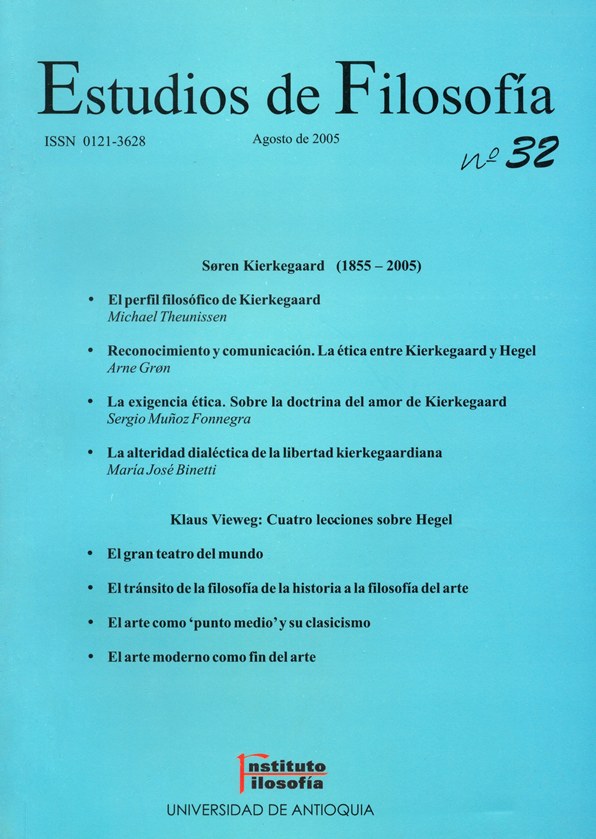"The great theater of the world". The Hegelian philosophy of history as a thinking consideration of human events with a rational, liberal and cosmopolitan intention
DOI:
https://doi.org/10.17533/udea.ef.12843Keywords:
Hegel, philosophy of history, rational intention, cosmopolitan intention, liberal intentionAbstract
The reflections presented in this paper refer to three interesting aspects of the Hegelian project that can show the current relevance of this thought, that is, the rational, liberal and cosmopolitan-global intention of his theory of history. From a systematical viewpoint, the philosophy of history constitutes the key to Hegel's practical philosophy, which was characterized by him as philosophy of right. This latter contains jurisprudence, ethics and a theory of the ethical forms. Simultaneously, the philosophy of universal history represents, within the systematical Hegelian architectonics, the transitional point from the objective to the philosophy of the absolute spirit; that is, the bridge between the objects of practical philosophy and an, religion and philosophical knowledge.
Downloads
Downloads
Published
How to Cite
License
Copyright (c) 2005 Klaus Vieweg

This work is licensed under a Creative Commons Attribution-NonCommercial-ShareAlike 4.0 International License.
Authors who publish with this journal agree to the following terms:
1. The Author retains copyright in the Work, where the term "Work" shall include all digital objects that may result in subsequent electronic publication or distribution.
2. Upon acceptance of the Work, the author shall grant to the Publisher the right of first publication of the Work.
3. The Author shall grant to the Publisher a nonexclusive perpetual right and license to publish, archive, and make accessible the Work in whole or in part in all forms of media now or hereafter known under a Creative Commons Attribution-NoCommercia-ShareAlike (CC BY-NC-SA 4.0), or its equivalent, which, for the avoidance of doubt, allows others to copy, distribute, and transmit the Work under the following conditions: (a) Attribution: Other users must attribute the Work in the manner specified by the author as indicated on the journal Web site;(b) Noncommercial: Other users (including Publisher) may not use this Work for commercial purposes;
4. The Author is able to enter into separate, additional contractual arrangements for the nonexclusive distribution of the journal's published version of the Work (e.g., post it to an institutional repository or publish it in a book), as long as there is provided in the document an acknowledgement of its initial publication in this journal;
5. Authors are permitted, and Estudios de Filosofía promotes, to post online the preprint manuscript of the Work in institutional repositories or on their Websites prior to and during the submission process, as it can lead to productive exchanges, as well as earlier and greater citation of published work (see The Effect of Open Access). Any such posting made before acceptance and publication of the Work is expected be updated upon publication to include a reference to the Estudios de Filosofía's assigned URL to the Article and its final published version in Estudios de Filosofía.















